
Illustration by Paul Reed / Observer Design
Last week, the companies responsible for polluting our waters were once again let off the hook by the government. But the fightback, from swimmers, surfers and environmentalists, is growing
Tim Adams
@TimAdamsWrites
Sun 14 Nov 2021
LONG READ
While the global leaders were in Glasgow at Cop26 last week, trying to agree forms of words to convince us they were serious about saving the planet, I was peering into a soupy brook that runs through protected wetland on the north Kent coast. In the past few months, the tidal brook at Long Rock beside the Swalecliffe wastewater treatment plant near Whitstable has become a potent symbol of the battle to enforce that most basic of environmental principles: don’t dump raw human sewage into rivers and seas.
I was standing beside the brook with Andy Taylor, a local musician and environmentalist. Most mornings for the past 15 years Taylor has monitored the big skies here for migrating birds that have decided to make a stopover – bramblings and fieldfares this morning – and also the quality of water in the brook. He points out to me the overflow pipes that sometimes feed untreated sewage directly into the stream. “Some days you come down here and it’s fine and you might even see kingfishers or water voles,” he says. “Other times it’s just dead and stinking, this nasty coffee colour.”
Taylor has a file of pictures of eels, a protected species, floating lifeless on the surface of the water. “They have literally swum all the way from the Sargasso Sea to get here,” he says. “But whatever goes in the water on that last 100 yards of their journey, they cannot survive.”
While we talk, we are joined by Jackie Kohler, who is walking her dogs and lives in one of a row of houses beside the brook at the entrance to the Swalecliffe plant. “What happens is when it rains the tanks overflow, the brook overflows and all the sewage starts running down the road, with all sorts in it and collects by our cars,” she says. “The kids have to use this bridge across the brook to get to school so residents have to come out and sweep it clean.”
You look forward to swimming all week and then you come down and find the sea’s full of shit again and you can’t go in
The brook merited a couple of paragraphs in the sentencing remarks of Mr Justice Johnson this July, in what was the most damning indictment of sewage management in this country since the Great Stink of 1858. The judge’s report effectively documented a surreptitious great stink that Southern Water had perpetrated over a six-year period from January 2010 to December 2015. The water company, whose major shareholders were a consortium ofAmerican and Australian banks, pleaded guilty to 51 counts of discharging untreated sewage into controlled coastal waters at 17 separate sites (including most frequently from the overflow pipes immediately offshore at Swalecliffe). “The total period during which untreated sewage was discharged was 61,704 hours, or just over seven years,” the judge noted. “It has been estimated that the total volume of untreated sewage across all of the sites was of 16-21bn litres or the equivalent of 7,400 Olympic-size swimming pools.”
Advertisement
In fining Southern Water a record sum of £90m for its systematic breaches, the judgment noted that “history shows that fines of hundreds of thousands or low millions of pounds have not had any effect on the defendant’s offending behaviour”.That criminality was emblematic of a nationwide scandal that means only 16% of English waterways are classified in good ecological health, and which places Britain 25th out of 30 EU countries for coastal water quality, with 200,000 outflows of raw sewage into bathing waters from Whitby to Penzance in May to September of this year alone.
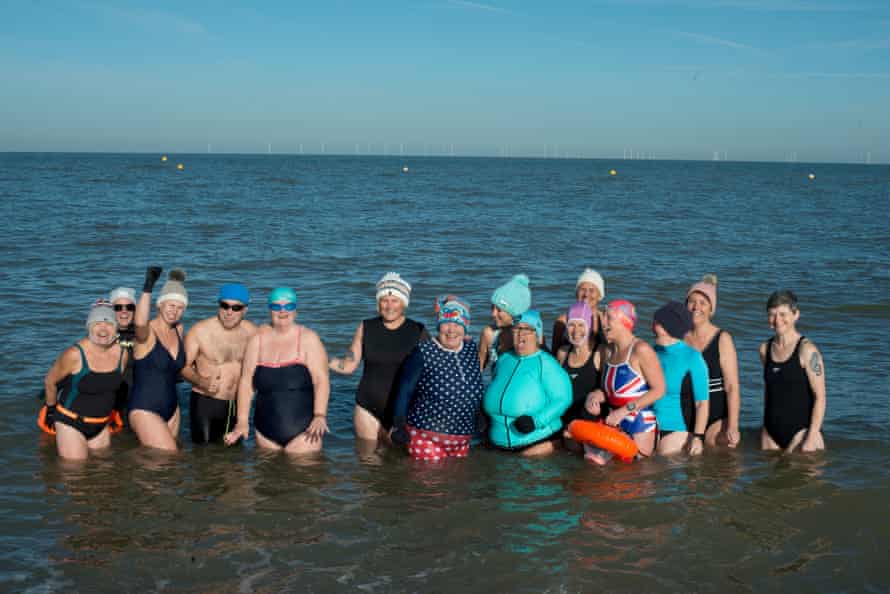
Members of the Whitstable Bubbletits and Bluetits swimming club, many of whom are also members of SOS (Save Our Seas).
Photograph: Sophia Evans/The Observer
The landmark ruling against Southern Water had several consequences. On a national level it focused attention on the ongoing scandal of so-called combined sewer overflows (CSOs) polluting rivers and seas. On a local level it prompted a wave of protest that has proved an object lesson in the capacity of community activism to shape the political agenda.
The start of that was a public meeting in Whitstable in August organised by the MP, Rosie Duffield, in which representatives of Southern Water were invited to address local concerns. Among those who came along to that meeting were five members of the Whitstable branch of the sea swimming group Bluetits. One of the leaders of this group, Sally Burtt-Jones, sitting sheltered from the biting North Sea wind in her beach hut at Tankerton, half a mile along the coast from Swalecliffe, explained to me what happened next.
“We had prepared quite well for the meeting,” Burtt-Jones says. She’s the daughter of an accountant and she’d gone through Southern Water’s investor reports to find a structure that transferred profits between various businesses with a Cayman Island holding company. “Given that they were supposed to be taking care of local drainage and water needs, none of that felt quite right to me.”
There was a widely held belief, supported by the July judgment, that Southern Water had been accepting fines – even the monster £90m fine – as an anticipated cost, rather than addressing the problems that provoked them (the government claims, without showing its working, that the infrastructure work necessary to put an end to CSOs would potentially cost water companies and their bill payers “between £350bn and £600bn”; most observers put the cost closer to a tenth of that higher figure).
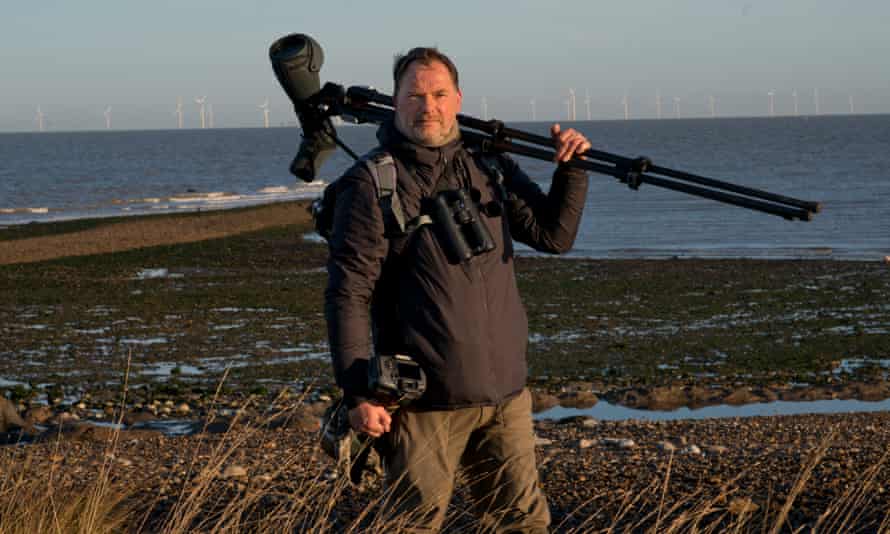
The landmark ruling against Southern Water had several consequences. On a national level it focused attention on the ongoing scandal of so-called combined sewer overflows (CSOs) polluting rivers and seas. On a local level it prompted a wave of protest that has proved an object lesson in the capacity of community activism to shape the political agenda.
The start of that was a public meeting in Whitstable in August organised by the MP, Rosie Duffield, in which representatives of Southern Water were invited to address local concerns. Among those who came along to that meeting were five members of the Whitstable branch of the sea swimming group Bluetits. One of the leaders of this group, Sally Burtt-Jones, sitting sheltered from the biting North Sea wind in her beach hut at Tankerton, half a mile along the coast from Swalecliffe, explained to me what happened next.
“We had prepared quite well for the meeting,” Burtt-Jones says. She’s the daughter of an accountant and she’d gone through Southern Water’s investor reports to find a structure that transferred profits between various businesses with a Cayman Island holding company. “Given that they were supposed to be taking care of local drainage and water needs, none of that felt quite right to me.”
There was a widely held belief, supported by the July judgment, that Southern Water had been accepting fines – even the monster £90m fine – as an anticipated cost, rather than addressing the problems that provoked them (the government claims, without showing its working, that the infrastructure work necessary to put an end to CSOs would potentially cost water companies and their bill payers “between £350bn and £600bn”; most observers put the cost closer to a tenth of that higher figure).

Andy Taylor at the Long Rock nature reserve.
Photograph: Sophia Evans/The Observer
Advertisement
“Southern Water sent two guys who were adamant they had been brought in to change things,” Burtt-Jones says (one of them, Toby Willison, was until November 2020 chief operating officer of the Environment Agency, which had brought the legal case against the water company). “They were still trying to have a bit of a pity party for their shareholders who hadn’t had any dividends since 2016,” she recalls. “I was like, ‘How dare you? You’ve got £340m in the bank.’ They told me I didn’t understand what I was talking about.”
The Bluetits group left that meeting feeling there was no real commitment or genuine timeline from Southern Water to end CSOs; sitting in the pub they decided to set up a campaign, Save Our Seas, SOS Whitstable. They created a logo and put the notes from the meeting – inevitably headlined “tits against shits” – online. Within a few days, they had 2,000 supporters. That week, there was yet another mechanical failure at the Swalecliffe plant and with sewage being pumped out, the beaches along the coast were shut for four days right in the middle of August.
The media attention helped the SOS group to start a campaign that focused on an amendment to the environment bill in the House of Lords. The amendment, brought by the independent peer, the Duke of Wellington, would hold water companies legally accountable to reduce the amount of sewage they were putting in the sea.
“We were hoping to get maybe nine or 10,000 people to sign a petition,” Burtt-Jones says. “But then I bumped into someone at a party who knew Deborah Meaden and she tweeted it out.” They got further momentum from hooking up with the longstanding pressure group Surfers Against Sewage.
Advertisement
“Southern Water sent two guys who were adamant they had been brought in to change things,” Burtt-Jones says (one of them, Toby Willison, was until November 2020 chief operating officer of the Environment Agency, which had brought the legal case against the water company). “They were still trying to have a bit of a pity party for their shareholders who hadn’t had any dividends since 2016,” she recalls. “I was like, ‘How dare you? You’ve got £340m in the bank.’ They told me I didn’t understand what I was talking about.”
The Bluetits group left that meeting feeling there was no real commitment or genuine timeline from Southern Water to end CSOs; sitting in the pub they decided to set up a campaign, Save Our Seas, SOS Whitstable. They created a logo and put the notes from the meeting – inevitably headlined “tits against shits” – online. Within a few days, they had 2,000 supporters. That week, there was yet another mechanical failure at the Swalecliffe plant and with sewage being pumped out, the beaches along the coast were shut for four days right in the middle of August.
The media attention helped the SOS group to start a campaign that focused on an amendment to the environment bill in the House of Lords. The amendment, brought by the independent peer, the Duke of Wellington, would hold water companies legally accountable to reduce the amount of sewage they were putting in the sea.
“We were hoping to get maybe nine or 10,000 people to sign a petition,” Burtt-Jones says. “But then I bumped into someone at a party who knew Deborah Meaden and she tweeted it out.” They got further momentum from hooking up with the longstanding pressure group Surfers Against Sewage.
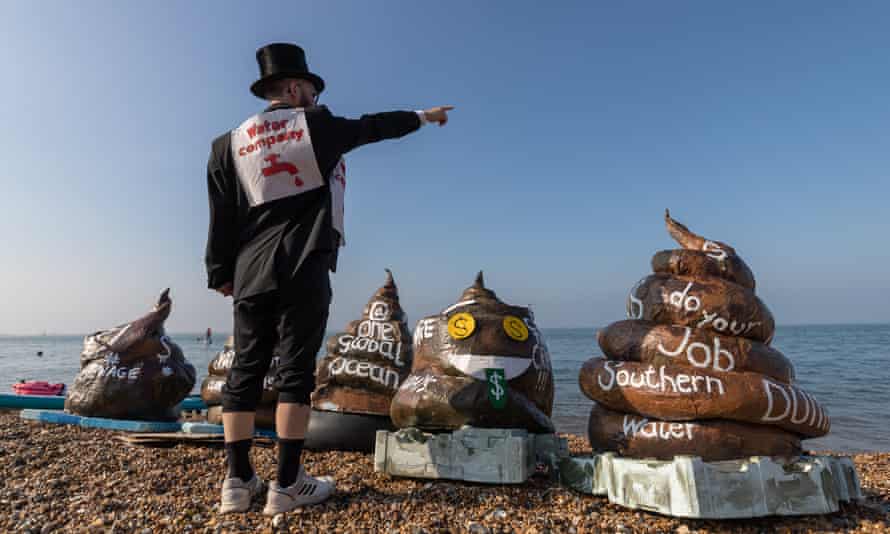
A protest by SOS Whitstable.
Photograph: Andrew Hastings/@imagedrum
By the time the 9th Duke of Wellington stood up to move his amendment, finding his own (overflowing) Waterloo, he could not resist “referring to a petition which has been circulating in recent days which already has over 90,000 signatures on it calling on the government to support this amendment”. Burtt-Jones shows me the footage of the debate on her phone. When the Green party peer Jenny Jones got up to praise the duke’s PR machine, he denied all responsibility: “Frankly I was as surprised as any of you that so many emails were sent out.”
The Lords supported the amendment, but of course, the following week the government whipped backbenchers to vote it down, despite a great wave of anger partly directed by the SOS Whitstable group that had seen MPs’ inboxes flooded with outrage about that decision.
The symbolism of that whipped vote was stark. The government’s refusal to back the duke’s amendment (on the grounds of the cost of investing in cleaner rivers and seas) exposed the flimsiness not only of their environmental commitment, but also of the loud election promises to rejuvenate Britain’s coastal communities after Brexit: how can you rejuvenate seaside towns when the beaches are closed and people won’t buy shellfish for fear of contamination? Some Tory MPs were affronted by the suggestion that in voting down greater legal powers against water companies they were voting “to dump sewage in the seas”. Their outrage ignored the fact that in the 30 years since privatisation successive governments had effectively encouraged utility companies to structure themselves as offshore debt instruments, beholden to shareholders not regulators. An investigation by the University of Greenwich, published in the Guardian, showed how since privatisation, £57bn had been paid out by water companies in share dividends – just about the precise cost of the criminally overdue infrastructure improvements that would prevent the sewage outflows.
By the time the 9th Duke of Wellington stood up to move his amendment, finding his own (overflowing) Waterloo, he could not resist “referring to a petition which has been circulating in recent days which already has over 90,000 signatures on it calling on the government to support this amendment”. Burtt-Jones shows me the footage of the debate on her phone. When the Green party peer Jenny Jones got up to praise the duke’s PR machine, he denied all responsibility: “Frankly I was as surprised as any of you that so many emails were sent out.”
The Lords supported the amendment, but of course, the following week the government whipped backbenchers to vote it down, despite a great wave of anger partly directed by the SOS Whitstable group that had seen MPs’ inboxes flooded with outrage about that decision.
The symbolism of that whipped vote was stark. The government’s refusal to back the duke’s amendment (on the grounds of the cost of investing in cleaner rivers and seas) exposed the flimsiness not only of their environmental commitment, but also of the loud election promises to rejuvenate Britain’s coastal communities after Brexit: how can you rejuvenate seaside towns when the beaches are closed and people won’t buy shellfish for fear of contamination? Some Tory MPs were affronted by the suggestion that in voting down greater legal powers against water companies they were voting “to dump sewage in the seas”. Their outrage ignored the fact that in the 30 years since privatisation successive governments had effectively encouraged utility companies to structure themselves as offshore debt instruments, beholden to shareholders not regulators. An investigation by the University of Greenwich, published in the Guardian, showed how since privatisation, £57bn had been paid out by water companies in share dividends – just about the precise cost of the criminally overdue infrastructure improvements that would prevent the sewage outflows.
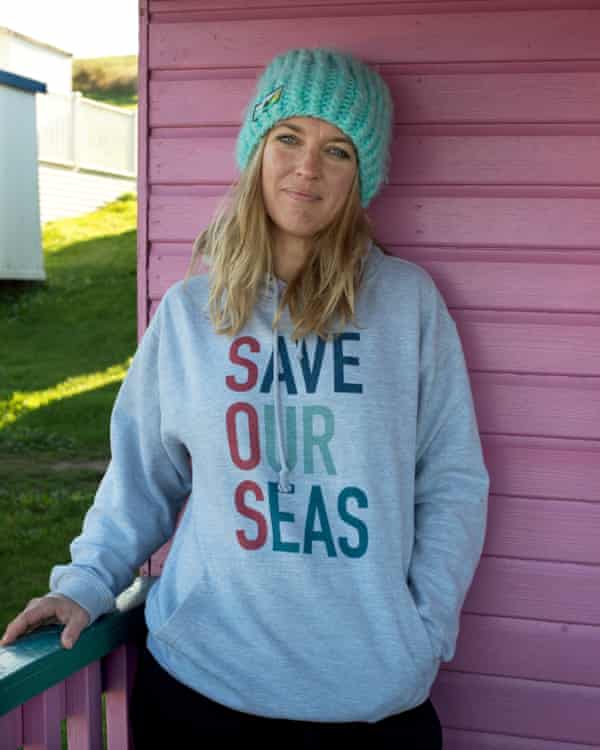
Sally Burtt-Jones. Photograph: Sophia Evans/The Observer
That impression of business as usual was compounded by the fact that in August it was announced that the Australian asset management group Macquarie had bought a controlling stake in Southern Water, promising £2bn to “strengthen a zero-tolerance mindset to pollution”. Those with not very long memories knew, following an in-depth BBC investigation, that in 2006, Macquarie had borrowed more than £2.8bn to finance the purchase of Thames Water (later repaying £2bn of the debt through new loans raised by a company subsidiary in Cayman Islands), effectively transferring the acquisition costs to Thames Water customers. In those 10 years, while Thames Water debt increased from £4bn to £10bn, share dividends averaged £270m per year. In 2015, when Thames announced a massive “super-sewer” investment project to help alleviate sewage outflows, the entire cost of the project was to come from increased customer bills.
One other result of the national spotlight being shone on the Southern Water scandal was that for perhaps the first time since Brexit, here was an issue that cut across political tribes. Few places in this country were as divided about leaving Europe as the towns of the north Kent coast, but the SOS Whitstable campaign drew support from all quarters: trawlermen and surf schools and Airbnb owners; politicians of both right and left; remainers and Brexiters. Across all of those voters there is a growing campaign to withhold payment of Southern Water bills until action is taken.
It’s shameful the government allows Southern Water to make large profits at the expense of companies like oursJames Green, Whitstable Oyster Company
Advertisement
At the sharpest end of that protest was the Whitstable Oyster Company, which in the past 30 years has become synonymous with the growth of the town as a tourist and foodie destination. The modern business (which originally dates back to the 1400s) was established by Barrie Green in 1978. It is now run by his sons: Richard, who looks after the restaurants, and James, who manages the oyster farming. I spoke to James in their Lobster Shack restaurant on the seafront last week. “I used to say things couldn’t get any worse,” he told me, still just about retaining a smile, “but I stopped saying that a while ago. Covid we sort of dealt with, though the furlough scheme didn’t help us because we still had to work on the farm. We were building up a stock of oysters, and the plan was to sell those to France as a bulk commodity. But that didn’t happen, because in March, because of Brexit, that market was completely shut to us – despite the fact that Defra had assured us for three years that there would be a clause in the agreement that protected our trade. That was 50% of our business gone overnight.”
Green looked in desperation for other markets. They started selling to Hong Kong and were doing OK up until the end of June. “Then,” he says, “we had a couple of cases of people who had eaten oysters coming down with norovirus, which is highly unusual in the summer.” With the details of the prosecution against Southern Water in the news, Public Health England connected the two and shut down the oyster farm for a month initially at end of June, while Green put “new testing procedures in place including pre-harvesting assessments”.
“We couldn’t sell anything in July and August. We went from maybe £100,000 sales of oysters in June to nothing at all.”
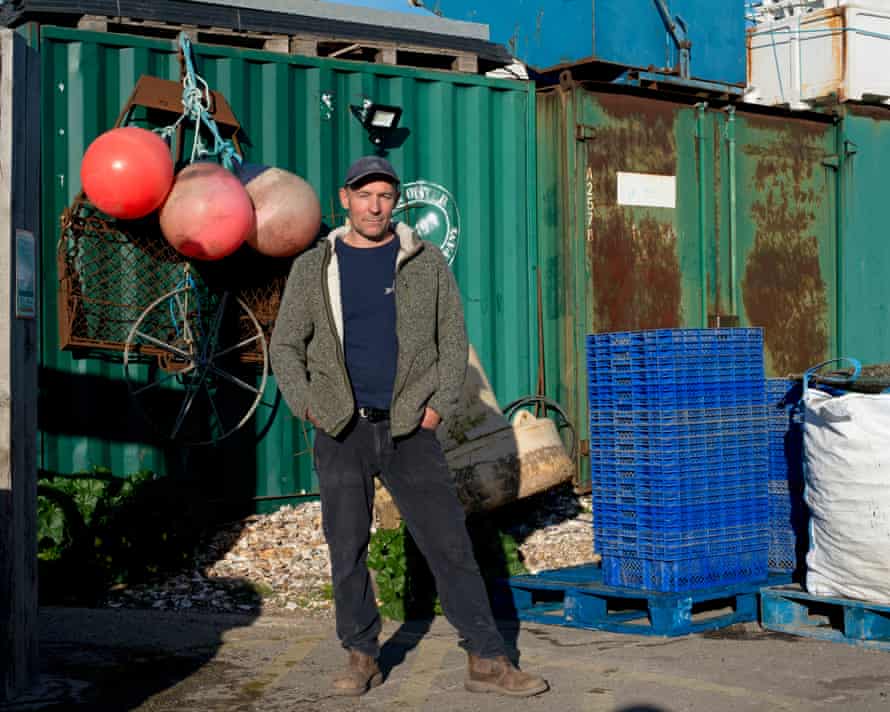
That impression of business as usual was compounded by the fact that in August it was announced that the Australian asset management group Macquarie had bought a controlling stake in Southern Water, promising £2bn to “strengthen a zero-tolerance mindset to pollution”. Those with not very long memories knew, following an in-depth BBC investigation, that in 2006, Macquarie had borrowed more than £2.8bn to finance the purchase of Thames Water (later repaying £2bn of the debt through new loans raised by a company subsidiary in Cayman Islands), effectively transferring the acquisition costs to Thames Water customers. In those 10 years, while Thames Water debt increased from £4bn to £10bn, share dividends averaged £270m per year. In 2015, when Thames announced a massive “super-sewer” investment project to help alleviate sewage outflows, the entire cost of the project was to come from increased customer bills.
One other result of the national spotlight being shone on the Southern Water scandal was that for perhaps the first time since Brexit, here was an issue that cut across political tribes. Few places in this country were as divided about leaving Europe as the towns of the north Kent coast, but the SOS Whitstable campaign drew support from all quarters: trawlermen and surf schools and Airbnb owners; politicians of both right and left; remainers and Brexiters. Across all of those voters there is a growing campaign to withhold payment of Southern Water bills until action is taken.
It’s shameful the government allows Southern Water to make large profits at the expense of companies like oursJames Green, Whitstable Oyster Company
Advertisement
At the sharpest end of that protest was the Whitstable Oyster Company, which in the past 30 years has become synonymous with the growth of the town as a tourist and foodie destination. The modern business (which originally dates back to the 1400s) was established by Barrie Green in 1978. It is now run by his sons: Richard, who looks after the restaurants, and James, who manages the oyster farming. I spoke to James in their Lobster Shack restaurant on the seafront last week. “I used to say things couldn’t get any worse,” he told me, still just about retaining a smile, “but I stopped saying that a while ago. Covid we sort of dealt with, though the furlough scheme didn’t help us because we still had to work on the farm. We were building up a stock of oysters, and the plan was to sell those to France as a bulk commodity. But that didn’t happen, because in March, because of Brexit, that market was completely shut to us – despite the fact that Defra had assured us for three years that there would be a clause in the agreement that protected our trade. That was 50% of our business gone overnight.”
Green looked in desperation for other markets. They started selling to Hong Kong and were doing OK up until the end of June. “Then,” he says, “we had a couple of cases of people who had eaten oysters coming down with norovirus, which is highly unusual in the summer.” With the details of the prosecution against Southern Water in the news, Public Health England connected the two and shut down the oyster farm for a month initially at end of June, while Green put “new testing procedures in place including pre-harvesting assessments”.
“We couldn’t sell anything in July and August. We went from maybe £100,000 sales of oysters in June to nothing at all.”

James Green, director of the Whitstable Oyster Fishery Company.
Photograph: Sophia Evans/The Observer
Green realises that talking about these issues is something of “a double-edged sword” for his business. “The fact is our oysters are safer now than they have ever been because we do so much testing and risk assessment,” he says. “But we have to build confidence again.” In Mr Johnson’s remarks he noted that the Whitstable Oyster Company should think about bringing a civil case against Southern Water. “We would need a class action to do that,” Green says. “You are taking on a $3bn company. They are not going to just roll over and give me £250,000 for loss of earnings – plus x for reputational damage – without a big fight.”
It was the early warning system of oyster testing that first alerted the Environment Agency to the scale of the problems with Southern Water. The trigger was data from the Centre for Environment Fisheries and Aquaculture Science, which monitors the shellfish beds, whose classifications at Whitstable were declining. A similar picture was noted in the Solent, also part of Southern Water’s geography. That prompted the national enforcement service to bring a comprehensive case against a water company for the first time in its history.
Owen Bolton, the Environment Agency’s senior crime officer, led that investigation. He explained to me on the phone the scale of the operation that was required, involving a team of 80, including 15 or 20 investigators in the field. “We collected 2 million lines of flow data,” he says. “And we also went into every Southern Water site to get site diaries, documents about incidents kept by the operator to hand over to the next shift, involving 27,000 entries.” At every stage, the judge noted, Southern Water attempted to obstruct this disclosure process.
Alan Cansdale, the Environment Agency’s area manager, suggests that it was never straightforward for investigators on the ground to build a case. “Sometimes, as with the unfortunate events [when Prince Charles visited Whitstable] for the Queen’s diamond jubilee weekend and there was a massive pollution incident with sewage debris all over the beaches, the issue is very obvious,” he says. “But mostly you are looking for very subtle environmental indicators.” In the end, he says, the investigation against Southern Water began with a very experienced investigator standing with him on a beach suggesting, “something here doesn’t feel right at all”.
One positive result of the July prosecution and fine is that Southern Water now reports CSOs from sites like Swalecliffe on an app almost in real time. The downside of that transparency is that it reveals just how often the discharges – which are supposed to be exceptional, storm-related events – take place.
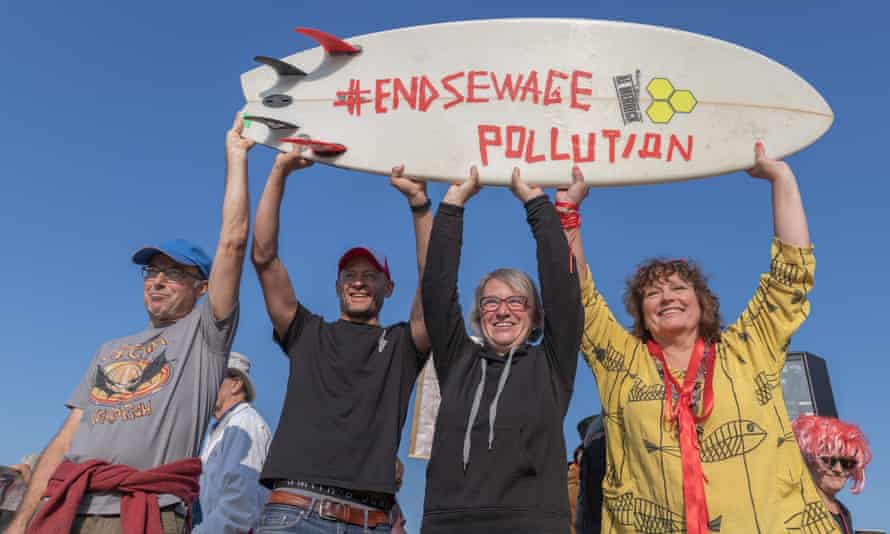
Green realises that talking about these issues is something of “a double-edged sword” for his business. “The fact is our oysters are safer now than they have ever been because we do so much testing and risk assessment,” he says. “But we have to build confidence again.” In Mr Johnson’s remarks he noted that the Whitstable Oyster Company should think about bringing a civil case against Southern Water. “We would need a class action to do that,” Green says. “You are taking on a $3bn company. They are not going to just roll over and give me £250,000 for loss of earnings – plus x for reputational damage – without a big fight.”
It was the early warning system of oyster testing that first alerted the Environment Agency to the scale of the problems with Southern Water. The trigger was data from the Centre for Environment Fisheries and Aquaculture Science, which monitors the shellfish beds, whose classifications at Whitstable were declining. A similar picture was noted in the Solent, also part of Southern Water’s geography. That prompted the national enforcement service to bring a comprehensive case against a water company for the first time in its history.
Owen Bolton, the Environment Agency’s senior crime officer, led that investigation. He explained to me on the phone the scale of the operation that was required, involving a team of 80, including 15 or 20 investigators in the field. “We collected 2 million lines of flow data,” he says. “And we also went into every Southern Water site to get site diaries, documents about incidents kept by the operator to hand over to the next shift, involving 27,000 entries.” At every stage, the judge noted, Southern Water attempted to obstruct this disclosure process.
Alan Cansdale, the Environment Agency’s area manager, suggests that it was never straightforward for investigators on the ground to build a case. “Sometimes, as with the unfortunate events [when Prince Charles visited Whitstable] for the Queen’s diamond jubilee weekend and there was a massive pollution incident with sewage debris all over the beaches, the issue is very obvious,” he says. “But mostly you are looking for very subtle environmental indicators.” In the end, he says, the investigation against Southern Water began with a very experienced investigator standing with him on a beach suggesting, “something here doesn’t feel right at all”.
One positive result of the July prosecution and fine is that Southern Water now reports CSOs from sites like Swalecliffe on an app almost in real time. The downside of that transparency is that it reveals just how often the discharges – which are supposed to be exceptional, storm-related events – take place.

SOS Whitstable.
Photograph: Andrew Hastings/@imagedrum
“We could cope if it was two or three times a year,” James Green says, “but we have had months when there have been eight or nine CSOs. Each time, we don’t harvest oysters for a couple of days afterwards, and then we make a risk assessment based on tides and weather conditions and then we test every single batch for E coli and norovirus until they are clean… It is shameful in my view that the government allows Southern Water to make large profits essentially at the expense of sustainable British companies like ours.”
In its defence, Southern Water argues that the pressures on sites such as Swalecliffe, built in the 1960s when the population it served was less than half of the current 40,000, have increased, exacerbated by climate change. Owen Bolton suggests that during their investigation Southern Water was seen to “be investing many millions of pounds in improvements – though many of the infrastructure problems are not things the water companies can solve in six months”.
Officials from the Environment Agency noted after the July verdict that the monitoring system can only work if there is a degree of trust in the operators: “We can’t be sat on every outflow, we can’t be monitoring every pipe.”
In the absence of that trust, the system increasingly depends on community activists to hold the water monopolies to account. Rob Yates, a Labour councillor in nearby Thanet, is also a keen wild swimmer (“I have swum from Alcatraz to San Francisco bay in a pair of Speedos,” he told me). Increasingly, however, he thinks of himself as “a citizen journalist”. Since he moved to Margate he has been swimming in a tidal pool near to one of Southern Water’s pumping stations. “I’ve seen panty liners and stuff in there a day or two after a release,” he says. In recent months Yates has been doing painstaking work, using Freedom of Information requests to try to see exactly how often the water company breaches the terms of its permit.
“The Environment Agency have had their funding cut by two-thirds since 2010,” he says. “They’re obviously going to focus on the big incidents, but if ordinary citizens started doing FoI requests you can begin to find out how many non-compliant incidents there have been and build a picture.”
One of the consequences of that monitoring is that Yates is among the first to see the EA’s testing results. On the day we speak he has seen a reading for E coli that is “very, very high”. “Now the problem for me is, I know that test was done probably five days ago, and it’s taken three days to get test results. So how do I know whether the water is safe now?”
The morning after I met Sally Burtt-Jones, the wind had stopped blowing quite so fiercely and perhaps 40 of the Whitstable Bluetits had gathered on the shingle in the weak morning sunshine outside Tankerton’s Marine Hotel, stripping down to swimming costumes (and bobble hats and gloves) to plunge into the frigid tidal waters. You might think of them as a small army of very British Erin Brockoviches, increasingly expert in the nuances of sewer management and corporate responsibility.
Advertisement
They include Dodda John-Baptist, 58, a recently retired headteacher, who moved down to Whitstable last year specifically so she could swim every day to ease her osteoarthritis. And Catherine Chapman and Jayne McClelland, who set the group up after the first lockdown as a way of rebuilding community. Watching the Bluetits plunge screaming into the sea, it’s impossible not to admire their collective will; afterwards, shivering on the shingle, several tell me that if it wasn’t for the group spirit they would not have had the courage either to swim or to stand up and be counted in the battle for cleaner seas and rivers.
While she gets dried I chat to Jane Dean, a retired police officer who has come down from Faversham. “I’ve never taken drugs and I don’t drink,” she says “but I can’t imagine the elation you get from any of that matches this. It lasts for hours after you come out. My friend said, ‘I bet people walk past and think: look at all those funny fat old ladies in the sea’. Actually, I said, they are thinking: ‘I wish I had the balls to do that.’”
“We could cope if it was two or three times a year,” James Green says, “but we have had months when there have been eight or nine CSOs. Each time, we don’t harvest oysters for a couple of days afterwards, and then we make a risk assessment based on tides and weather conditions and then we test every single batch for E coli and norovirus until they are clean… It is shameful in my view that the government allows Southern Water to make large profits essentially at the expense of sustainable British companies like ours.”
In its defence, Southern Water argues that the pressures on sites such as Swalecliffe, built in the 1960s when the population it served was less than half of the current 40,000, have increased, exacerbated by climate change. Owen Bolton suggests that during their investigation Southern Water was seen to “be investing many millions of pounds in improvements – though many of the infrastructure problems are not things the water companies can solve in six months”.
Officials from the Environment Agency noted after the July verdict that the monitoring system can only work if there is a degree of trust in the operators: “We can’t be sat on every outflow, we can’t be monitoring every pipe.”
In the absence of that trust, the system increasingly depends on community activists to hold the water monopolies to account. Rob Yates, a Labour councillor in nearby Thanet, is also a keen wild swimmer (“I have swum from Alcatraz to San Francisco bay in a pair of Speedos,” he told me). Increasingly, however, he thinks of himself as “a citizen journalist”. Since he moved to Margate he has been swimming in a tidal pool near to one of Southern Water’s pumping stations. “I’ve seen panty liners and stuff in there a day or two after a release,” he says. In recent months Yates has been doing painstaking work, using Freedom of Information requests to try to see exactly how often the water company breaches the terms of its permit.
“The Environment Agency have had their funding cut by two-thirds since 2010,” he says. “They’re obviously going to focus on the big incidents, but if ordinary citizens started doing FoI requests you can begin to find out how many non-compliant incidents there have been and build a picture.”
One of the consequences of that monitoring is that Yates is among the first to see the EA’s testing results. On the day we speak he has seen a reading for E coli that is “very, very high”. “Now the problem for me is, I know that test was done probably five days ago, and it’s taken three days to get test results. So how do I know whether the water is safe now?”
The morning after I met Sally Burtt-Jones, the wind had stopped blowing quite so fiercely and perhaps 40 of the Whitstable Bluetits had gathered on the shingle in the weak morning sunshine outside Tankerton’s Marine Hotel, stripping down to swimming costumes (and bobble hats and gloves) to plunge into the frigid tidal waters. You might think of them as a small army of very British Erin Brockoviches, increasingly expert in the nuances of sewer management and corporate responsibility.
Advertisement
They include Dodda John-Baptist, 58, a recently retired headteacher, who moved down to Whitstable last year specifically so she could swim every day to ease her osteoarthritis. And Catherine Chapman and Jayne McClelland, who set the group up after the first lockdown as a way of rebuilding community. Watching the Bluetits plunge screaming into the sea, it’s impossible not to admire their collective will; afterwards, shivering on the shingle, several tell me that if it wasn’t for the group spirit they would not have had the courage either to swim or to stand up and be counted in the battle for cleaner seas and rivers.
While she gets dried I chat to Jane Dean, a retired police officer who has come down from Faversham. “I’ve never taken drugs and I don’t drink,” she says “but I can’t imagine the elation you get from any of that matches this. It lasts for hours after you come out. My friend said, ‘I bet people walk past and think: look at all those funny fat old ladies in the sea’. Actually, I said, they are thinking: ‘I wish I had the balls to do that.’”
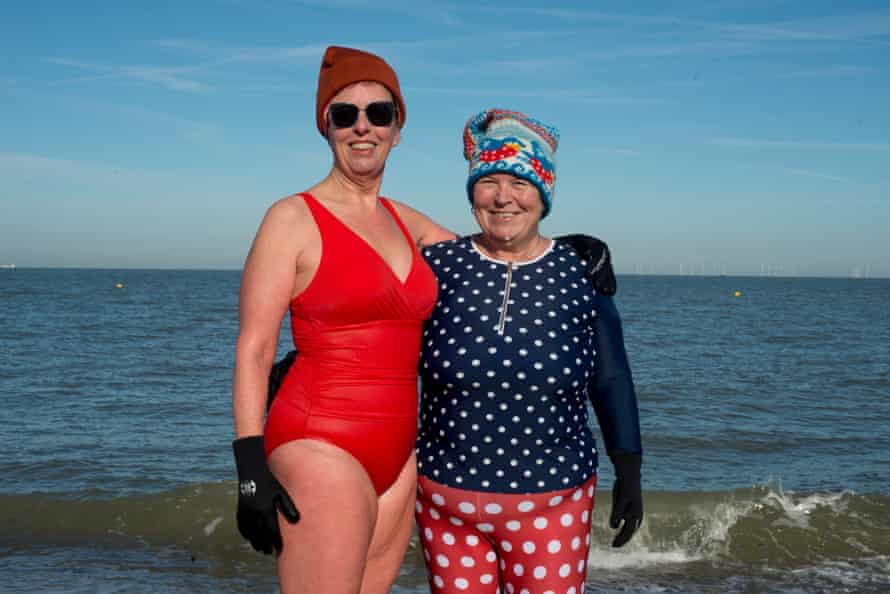
Jayne McClelland and Jane Dean of the Bluetits swimming club.
Photograph: Sophia Evans/The Observer
Dean turned 60 was last week. She got her pension on Monday and spent the lump sum on Tuesday, buying a motorhome in which she and her swimming pal plan to tour the coast around to Devon, “tits on tour”, sewage permitting. “Sometimes swimming is the thing you look forward to all week,” she says, “and then you come down here and find the sea’s full of shit again and you can’t go in and your heart just sinks. These days it seems to happen every time it rains…”
We turn to the £90m question of how you make monopoly water operators invest in infrastructure. The consensus is that the directors of these companies need to be held to account in some way for the environmental crimes that occur on their watch. (Southern Water’s CEO during the period for which it was prosecuted, Matthew Wright, announced himself “as shocked as anyone” by the judge’s findings. He left his £700,000 a year job in 2017 and became UK managing director of the £3bn Danish energy firm Ørsted.)
Dean turned 60 was last week. She got her pension on Monday and spent the lump sum on Tuesday, buying a motorhome in which she and her swimming pal plan to tour the coast around to Devon, “tits on tour”, sewage permitting. “Sometimes swimming is the thing you look forward to all week,” she says, “and then you come down here and find the sea’s full of shit again and you can’t go in and your heart just sinks. These days it seems to happen every time it rains…”
We turn to the £90m question of how you make monopoly water operators invest in infrastructure. The consensus is that the directors of these companies need to be held to account in some way for the environmental crimes that occur on their watch. (Southern Water’s CEO during the period for which it was prosecuted, Matthew Wright, announced himself “as shocked as anyone” by the judge’s findings. He left his £700,000 a year job in 2017 and became UK managing director of the £3bn Danish energy firm Ørsted.)
I asked Anne Brosnan, the chief prosecutor for the EA in the Southern Water case, if the agency had considered bringing charges against directors as well as the company itself?
“Yes,” she said. “We have prosecuted individual directors in the past and we will do so in the future. We are now looking at that possibility more closely than ever. But we obviously always have to follow the evidence.”
The Guardian view on sewage: ministers must insist on a clean-up
Last Monday, as MPs were finally voting not to include the duke’s amendment in their environment bill, Southern Water invited a group of local residents – including Sally Burtt-Jones, Andy Taylor and Jackie Kohler – to tour its Swalecliffe site and hear about improvements that were planned. While they were being shown pristine overflow tanks and being told that the pipes into the brook would be capped in the next fortnight, MPs were announcing their partial U-turn on the duke’s amendment, which proposed “a duty of progressive reduction” on sewage dumping. Among those criticising the diluted legislation was former Liberal Democrat leader Tim Farron. “There are no targets in terms of volume or in terms of timescale, which leaves water companies with the power to continue what they do now.”
In the course of her tour at Swalecliffe, Burtt-Jones asked the Southern Water representative if at the very least the company would agree to pay for technology that could monitor sea water safety in real time. “The bloke behaved as if that idea had never occurred to him,” she says. There is no doubt a hope from the government that the stink surrounding this issue will fade. I wouldn’t be so sure. Having finally found an issue on which all of the country can agree, groups such as the Whitstable Bluetits – not to mention the hundreds of thousands of people who support Surfers Against Sewage and other local protests forming up and down the country – are not going anywhere. “The thing is,” Burtt-Jones says, “this is such a simple issue for anyone to understand. Even very small children get it: when they go to the beach, they don’t want to find that the sea is full of poo
No comments:
Post a Comment